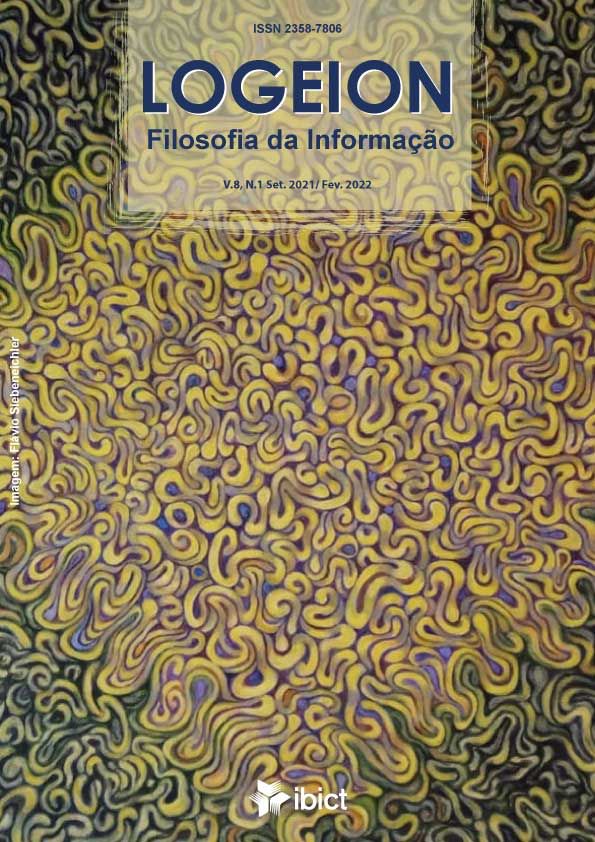Principles to philosophy of information
among an ontology or an epistemology of the subject
DOI:
https://doi.org/10.21728/logeion.2021v8n1.p46-60Keywords:
Philosophy of Information, Documentation, Ontology, EpistemologyAbstract
The discussions and problems that arise in a developing area – Information Science is a case of it – lead to a theoretical and ‘philosophical’ task. In this context, as a primordial task, the foundations and principles that would ensure the work and the conceptual delimitation of the object apprehended by this science (Information Science) would be radically questioned. The goal of this article is to analyze two philosophical proposals about Information Science foundations; a comparison of two theoretical proposals about the object of Information Science: one ontological and another so-called an epistemological approach. This comparative plan will be based on the theoretical positions of Floridi and Frohmann (outlining what both proposes, as well as what would be defended by which one about an Philosophy of Information). Thus, guided by the theoretical-exploratory method of investigation, the research focuses on a qualitative literature review. The outcome intents a theoretical contribution, would consist of raising such a state of the art about fundamental research in this area. Finally, the considerations orbit the modus operandi that which one (Floridi and Frohmann) end up using for this type of theoretical project, as well as the conception of philosophy that motivates these researches.
Downloads
References
BRETON, P. A utopia da comunicação. Lisboa: Instituto Piaget, 1994.
CAPURRO, R. Contribuições para uma ontologia digital. 2009. Acesso em: http://www.capurro.de/ontologiadigital_pt.html Acesso em: 26 de abril de 2021.
CAPURRO, R. Foundations of Information Science: review and perspectives. 2016 Disponível em: http://www.capurro.de/tampere91.htm Acesso em: 26 de abril de 2021.
CASTELLS, M. A sociedade em Rede. 6. ed. São Paulo: Paz & Terra, 1999. (Coleção A era da informação: economia, sociedade e cultura; v.1)
DAY, R. LIS, method, and postmodern science. Journal of Education for Library and Information Science, v. 37, n. 4, p. 317-324, 1996. Disponível em: https://www.jstor.org/stable/pdf/40324240.pdf Acesso em: 26 de abril de 2021.
DAY, R. E. Martin Heidegger's Critique of Informational Modernity. In: LECKIE, G. L.; GIVE, L. M.; BUSCHMAN, J. Critical Theory in Library and Information Science: exploring the social from across the disciplines. Santa Barbara: Libraries Unlimited, 2010.
DI FELICE, M. Paisagens pós-urbanas: os fins da experiência urbana e as formas comunicativas do habitar. São Paulo: Annablume, 2009. (Atopos)
FLORIDI, L. On defining Library and Information Science as applied philosophy of Information. Social Epistemology, on line, v. 16, n. 1, p.37-49, 2002. Disponível em:.https://pdfs.semanticscholar.org/5476/505f9d21f99e1c5618f8e685df62d665d34e.pdf Acesso em: 26 de abril de 2021.
FLORIDI, L. Biblioteconomia e Ciência da Informação (BCI) como filosofia da informação aplicada: uma reavaliação. InCID: Revista de Ciência da Informação e Documentação, Ribeirão Preto, v. 1, n. 2, p. 37-47, jul./dez. 2010. Disponível em: http://www.revistas.usp.br/incid/article/view/42318 Acesso em: 26 de abril de 2021.
FOUCAULT, M. Vigiar e punir: nascimento da prisão. 20. ed. Trad. de Raquel Ramalhete. Petrópolis: Vozes, 1999.
FOUCAULT, M. Microfísica do poder. 5. ed. Rio de Janeiro: Paz e Terra, 2017.
FROHMANN, B. Documentation redux: prolegomenon to (another) philosophy of information. Library Trends, v. 52, n. 3, p. 387-407, 2004. Disponível em: https://www.ideals.illinois.edu/bitstream/handle/2142/1683/Frohmann387407.pdf?sequ ence=2&isAllowed=y. Acesso em: 26 de abril de 2021.
HAN, B-C. Sociedade do cansaço. 2. ed. amp. Trad. Enio P. Giachini. Petrópolis: Vozes, 2017.
HEIDEGGER, M. Que é isto – a filosofia? In: HEIDEGGER, M. Marcas do caminho. Petrópolis: Vozes, 2010.
HEIDEGGER, M. A questão da técnica. Scientiœ Studia. São Paulo, v. 5, n. 3, p. 375-398, 2007. Disponível em: http://www.scielo.br/scielo.php?script=sci_arttext&pid=S1678-31662007000300006 Acesso em: 26 de abril de 2021.
HEIDEGGER, M. Ser e tempo. Edição alemão-português. Tradução, organização, nota previa, anexos e notas de F. Castilho. Campinas: Vozes, 2012 (Multilíngues de Filosofia Unicamp).
HEIDEGGER, M. As questões fundamentais da filosofia: “problemas” seletos da “lógica”. São Paulo: WMF Martins Fontes, 2017.
ILHARCO, F. Filosofia da informação: uma introdução à informação como fundação da acção, da comunicação e da decisão. Lisboa: Universidade Católica, 2003.
LYOTARD, J-F. A condição pós-moderna. 12. ed. Trad. Ricardo C. Barbosa. Rio de Janeiro: José Olímpio, 2009.
POMBO, O. Epistemologia da interdisciplinaridade. In. SEMINÁRIO INTERNACIONAL INTERDISCIPLINARIDADE , HUMANISMO, UNIVERSIDADE, Faculdade de Letras da Universidade do Porto, 2003. Disponível em: http://erevista.unioeste.br/index.php/ideacao/article/view/4141/3187 Acesso em: 26 de abril de 2021.
SARACEVIC, T. Ciência da Informação: origem, evolução e relações. Perspectivas em Ciência da Informação: Belo Horizonte, v. 1, n. 1, p. 41-62, jan./jun. 1996. Disponível em: http://portaldeperiodicos.eci.ufmg.br/index.php/pci/article/viewFile/235/22 Acesso em: 26 de abril de 2021.
SMIT, J. W. A informação na Ciência da Informação. InCID: Revista de Ciência da Informação e Documentação, Ribeirão Preto, SP, v. 3, n. 2, p. 84-101, jul./dez. 2012. Disponível em: http://www.revistas.usp.br/incid/article/view/48655/52726. Acesso em: 26 de abril de 2021.
WIENER, N. Cibernética e sociedade: o uso humano de seres humanos. 2. ed. São Paulo: Cultrix, 1968.
WITTGENSTEIN, L. Investigações filosóficas. Trad. de Marcos G. Montagnoli. Revisão da tradução e apresentação de Emmanuel Carneiro Leão. 3. ed. Petrópolis: Vozes, 2004.
Downloads
Published
Issue
Section
License
Copyright (c) 2023 Logeion: Filosofia da Informação

This work is licensed under a Creative Commons Attribution-NonCommercial-ShareAlike 4.0 International License.
The journal is published under the Creative Commons - Attribution - Noncommercial - Share Alike 3.0 Brazil.
The published work is considered collaboration and therefore the author will not receive any remuneration for this as well as anything will be charged in exchange for publication.
All texts are responsibility of the authors.
It’s allowed partial or total reproduction of the texts of the magazine since the source is cited.




